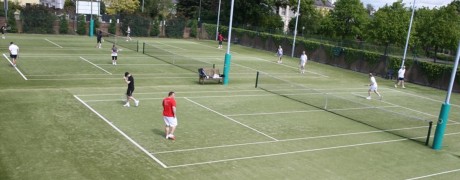Silencing the inner critic
I’ve been thinking lately about the role of the self in teaching. It’s hard to be true to yourself in the classroom when you feel like you’re performing. On top of everything, that critical voice in your head is always telling you that you can do better. In his book, The Inner Game of Tennis, coach Timothy Gallway recounts how he would often hear tennis players muttering and talking to themselves, particularly after an error in play. He noticed that the critical words they used, weren’t actually very useful in helping them improve or overcome the problem that led to a poor hit. Rather, he found that by taking a non-judgmental and accepting approach, players were better able to improve their game.
As language teachers, part of our job is helping others improve their language skills and to improve our own teaching, as well. Gallway suggests that we are more likely to actually get better if rather than criticize ourselves internally, we are able to look dispassionately at our flaws and be gentle with ourselves. We are likely to respond much more effectively. to kind words from ourselves (or others) than to criticism.




